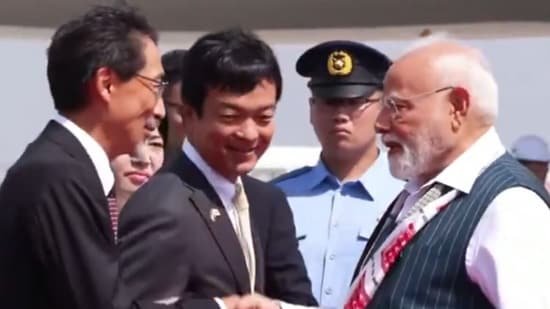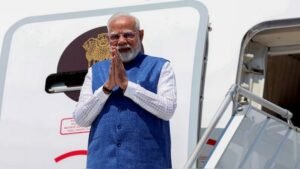Prime Minister Modi lands in Japan today, marking another milestone in India-Japan diplomatic relations. The 15th India-Japan Annual Summit brings together world leaders to discuss crucial bilateral cooperation areas. This visit comes during a pivotal moment for both Asian economic powerhouses seeking deeper strategic partnerships.
Historic Significance of This High-Level Summit Meeting
The India-Japan Summit represents decades of growing friendship between these democratic nations across Asia. Both countries share common values, including democracy, the rule of law, and a commitment to regional peace. Strategic cooperation has evolved significantly since the first summit meeting in 2000 between the two nations.
Technology collaboration takes centre stage during this important diplomatic gathering between Asian partners. Advanced manufacturing, artificial intelligence, and clean energy solutions dominate the bilateral agenda discussions. Both nations recognise innovation as the foundation for future economic growth and global competitiveness.
The timing proves particularly strategic as both countries face complex regional security challenges today. China’s growing influence across Asia creates shared concerns about maintaining regional stability. Military cooperation and defence partnerships continue expanding through joint exercises and equipment-sharing agreements.
Key Agenda Items Shaping Future Bilateral Relations
Several major topics will dominate discussions during PM Modi’s visit to Tokyo this week:
- Bullet train infrastructure projects and high-speed rail technology transfers
- Trade agreements and enhanced economic cooperation frameworks
- Defence partnerships and military technology sharing initiatives
- Digital transformation and unicorn startup ecosystem development
- Climate change mitigation and renewable energy collaboration
The bullet train project remains a symbol of successful India-Japan cooperation in infrastructure development. Japan’s Shinkansen technology helps India modernise its railway systems while creating jobs. This partnership demonstrates how both nations benefit through technology transfer and knowledge sharing.
Trade discussions focus on expanding bilateral commerce beyond current levels of approximately $18 billion annually. Manufacturing partnerships, especially in automobiles and electronics, could see significant growth through streamlined regulations. Small and medium enterprises from both countries also gain new opportunities for cross-border collaboration.
Defence Cooperation Reaches New Strategic Heights
Defence partnerships between India and Japan have strengthened considerably over the past decade. Joint military exercises demonstrate growing trust and operational coordination between armed forces. Intelligence sharing agreements also enhance regional security cooperation against common threats.
Maritime security cooperation becomes increasingly important as both nations depend on open sea lanes. The Indo-Pacific region faces growing tensions that require coordinated responses from democratic allies. Naval partnerships help ensure freedom of navigation through critical shipping routes.
Technology sharing in defence equipment reduces dependence on other suppliers while building indigenous capabilities. Joint research and development projects create advanced systems tailored to regional security requirements. Both nations benefit from shared expertise in missile defence and surveillance systems.
Economic Partnership Models for Regional Development
The summit addresses creating robust economic partnerships that benefit both Asian economies significantly. Unicorn startup collaborations could revolutionise how both nations approach innovation and entrepreneurship. Cross-border investment flows continue growing as regulatory barriers decrease through bilateral agreements.
Manufacturing partnerships leverage Japan’s advanced technology with India’s skilled workforce and large market. Automotive companies already demonstrate successful collaboration models that other industries could replicate. Electronics manufacturing represents another area with tremendous growth potential through strategic partnerships.
Supply chain diversification efforts gain momentum as both nations seek alternatives to China-centric systems. Regional value chains create opportunities for smaller economies throughout Asia to participate. This approach builds resilience while reducing dependence on single-source suppliers across critical industries.
Tokyo Summit Impact on Regional Stability
The Tokyo meetings occur against a backdrop of shifting geopolitical dynamics across Asia. Both democratic nations share concerns about authoritarian challenges to regional peace. Diplomatic coordination helps present unified approaches to complex international issues.
Economic statecraft becomes increasingly important as nations use trade relationships to advance political objectives. The India-Japan partnership demonstrates how democratic allies can create mutually beneficial arrangements. These models could inspire other regional partnerships based on shared values.
Cultural exchanges also strengthen people-to-people connections that support long-term diplomatic relationships. Educational partnerships create lasting bonds between future leaders from both nations. Tourism promotion helps citizens understand and appreciate each other’s rich cultural heritage.
Looking Ahead: Future Prospects for Bilateral Cooperation
This summit sets the foundation for expanded cooperation across multiple sectors during the coming years. Both nations commit to regular high-level dialogue mechanisms that address emerging challenges. Strategic partnerships require consistent attention and adaptation to changing global circumstances.
Climate change cooperation becomes increasingly urgent as both nations face environmental challenges. Joint research initiatives could develop innovative solutions applicable throughout Asia. Green technology partnerships also create new economic opportunities while addressing sustainability goals.
The success of India-Japan cooperation could serve as a template for other regional partnerships. Democratic nations benefit from coordinating responses to shared challenges while maintaining sovereignty. This balanced approach respects national interests while advancing common objectives through diplomatic engagement.







Be First to Comment